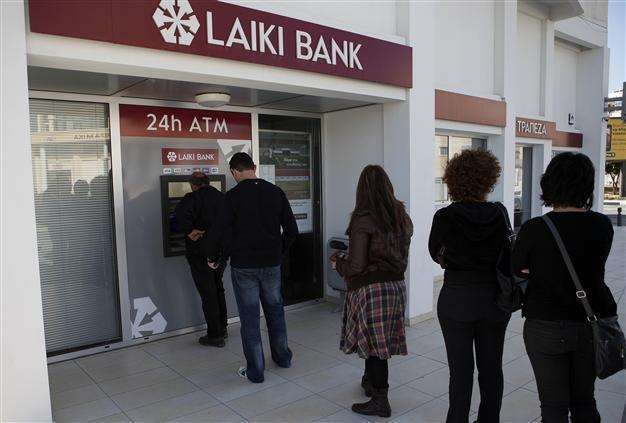South Cyprus leader faces anger at bank-saving EU bailout
NICOSIA - Agence France-Presse

eople queue to use an ATM machine outside of a Laiki Bank branch in Larnaca, South Cyprus, Saturday, March 16, 2013. Many rushed to cooperative banks which are open Saturdays in South Cyprus after learning that the terms of a bailout deal that the cash-strapped country hammered out with international lenders includes a one-time levy on bank deposits. AP photo
President Nicos Anastasiades on March 16 tried to appease South Cypriots' anger at having to pay up from their bank deposits for part of an EU bailout deal which his government signed to rescue the island's banks.Faced with protest calls, the president said he will address the nation on March 17 to defend the controversial deal which he admitted was "painful" but insisted was the only way to save the banking sector from total collapse.
"Either we could choose the catastrophic scenario of a disorderly default or a painful but controlled management of the crisis that definitively ends the uncertainty and provides a starting point to kick-start the economy," he said.
He said thousands of small businesses would have gone bankrupt because of cash flow problems without the deal and the unprecedented bank levy attached for an EU bailout.
"As a result the services sector would have been driven to utter collapse with the possibility of exiting the euro. Apart from weakening South Cyprus, it would have led to a currency devaluation of 40 percent," said Anastasiades.
Savers in South Cyprus banks reacted with shock and anger after his government agreed to the levy on bank deposits in return for a desperately needed 10-billion-euro ($13 billion) bailout.
The debt rescue package, agreed with the eurozone and International Monetary Fund after around 10 hours of talks in Brussels, is significantly less than the 17 billion euros South Cyprus had initially sought.
Most of the balance is to be made up through the bank deposit levy of up to 9.9 percent -- the first eurozone bailout in which private depositors are having to help foot the bill.
The government had held out against the bailout condition until the 11th hour, arguing it would risk a run not only on the island's own banks but also on those of other debt-ridden eurozone economies.
Opposition leader George Lillikas has called on his supporters to protest on March 16, charging that the president who was elected only last month had "betrayed the people's vote." The Bank of Cyprus, the island's largest lender, said it was "absolutely understandable and justified for public opinion to be concerned." The government's acceptance of the terms prompted a flood of angry comments on the Internet, and some savers queued up at ATM machines in a desperate bid to withdraw their savings.
"This is like stealing!" said Kyriakos, an artist, at a bank ATM machine as he tried to withdraw whatever cash he could in a bid to reduce the amount he will have to pay.
"I earned this money, and now it is taken to cover for some mistakes that are not my fault," he said, with banks not due to reopen until Tuesday after a long holiday weekend including a pre-Easter carnival marred by the bank savings news.
Ministers are now in a race against the clock to thrash out draft legislation ratifying the bailout and push it through parliament before banks reopen. MPs are to convene on Sunday for the emergency debate, state news agency CNA said.
The levy will see deposits of more than 100,000 euros by all residents of Cyprus hit with a 9.9 percent charge when lenders reopen their doors. Under that threshold and the levy drops to 6.75 percent.
At the same time, an additional "withholding tax" will be imposed on interest on bank deposits, and South Cyprus will have to hike corporate tax to 12.5 percent from 10 percent and sell off state assets.
The vice president of the Cyprus Institute of Certified Public Accountants, Marios Skandalis, warned: "There is a very high risk that this could be the end of Cyprus as a strong and reliable financial centre." Centre-right MP Nicolas Papadopoulos, the son of a former president, told state radio the agreement was a "disaster" for the South Cyprus banking system, which is nearly eight times the size of the island's economy.
South Cyprus -- which accounts for just 0.2 percent of the combined eurozone economy -- is the fifth country to secure a debt rescue package from its eurozone partners in the three-year debt crisis.
















